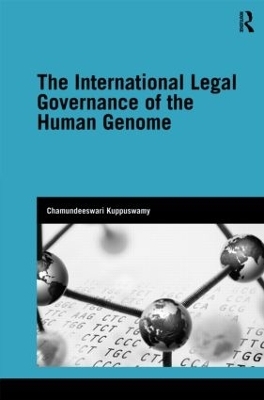
The International Legal Governance of the Human Genome
Seiten
2009
Routledge (Verlag)
978-0-415-45857-3 (ISBN)
Routledge (Verlag)
978-0-415-45857-3 (ISBN)
This book explores international governance of the human genome from a human rights perspective and challenges paradigms of property that are entrenched in relevant international instruments.
The human genome is a well known symbol of scientific and technological progress in the twenty-first century. However, concerns about the exacerbation of inequalities between the rich and the poor, the developing and the developed states, the healthy and the unhealthy are causing problems for the progress of scientific research. The international community is moving towards a human rights approach in addressing these concerns.
Such an approach will be piecemeal and ineffective so long as fundamental issues about economic, social and cultural rights, the so-called second generation of human rights, are not addressed. This book argues that, in order to be able to meaningfully apply a human rights framework to the governance of the human genome, the international human rights framework should be based on a unified theory of human rights where the distinction between positive and negative rights is set aside.
The book constructs a common heritage concept with the right to development at its core and explores the content of the right to development through rational human rights theory. It is argued that the notion of property rights in the human genome should be placed within the context of protecting human rights, including the right to development. The concept of common heritage of humanity, contrary to the widely held belief that it is in opposition to patenting of gene sequences, supports human rights-based conceptions of property rights.
This book fills a gap in the literature on international legal governance of the human genome will provide an essential reference point for research into the right to development, development issues in bioethics, the role of international institutions in law making and research governance.
The human genome is a well known symbol of scientific and technological progress in the twenty-first century. However, concerns about the exacerbation of inequalities between the rich and the poor, the developing and the developed states, the healthy and the unhealthy are causing problems for the progress of scientific research. The international community is moving towards a human rights approach in addressing these concerns.
Such an approach will be piecemeal and ineffective so long as fundamental issues about economic, social and cultural rights, the so-called second generation of human rights, are not addressed. This book argues that, in order to be able to meaningfully apply a human rights framework to the governance of the human genome, the international human rights framework should be based on a unified theory of human rights where the distinction between positive and negative rights is set aside.
The book constructs a common heritage concept with the right to development at its core and explores the content of the right to development through rational human rights theory. It is argued that the notion of property rights in the human genome should be placed within the context of protecting human rights, including the right to development. The concept of common heritage of humanity, contrary to the widely held belief that it is in opposition to patenting of gene sequences, supports human rights-based conceptions of property rights.
This book fills a gap in the literature on international legal governance of the human genome will provide an essential reference point for research into the right to development, development issues in bioethics, the role of international institutions in law making and research governance.
Chamundeeswari Kuppuswamy is Lecturer at Sheffield Law school, UK. Her research interests are international law, particularly governance of new technologies, international human rights, property and intellectual property law.
Part 1: The Human Genome and Bioethics Part 2: International Organisations and the Human Genome Part 3: The Common Heritage of Mankind in International Law Part 4: The Common Heritage of Humanity and the Right to Development Part 5: Human Rights, Common Heritage and Development – A Moral Perspective Part 6: The Common Heritage of Humanity and Intellectual Property Rights Part 7: Conclusion
| Erscheint lt. Verlag | 8.6.2009 |
|---|---|
| Reihe/Serie | Genetics and Society |
| Verlagsort | London |
| Sprache | englisch |
| Maße | 156 x 234 mm |
| Gewicht | 476 g |
| Themenwelt | Recht / Steuern ► Allgemeines / Lexika |
| Recht / Steuern ► EU / Internationales Recht | |
| Sozialwissenschaften ► Politik / Verwaltung | |
| ISBN-10 | 0-415-45857-9 / 0415458579 |
| ISBN-13 | 978-0-415-45857-3 / 9780415458573 |
| Zustand | Neuware |
| Haben Sie eine Frage zum Produkt? |
Mehr entdecken
aus dem Bereich
aus dem Bereich
Sammlung des Zivil-, Straf- und Verfahrensrechts, Rechtsstand: 19. …
Buch | Hardcover (2024)
C.H.Beck (Verlag)
49,00 €


